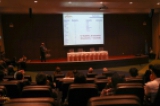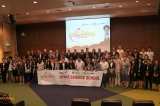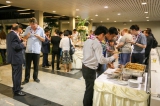
The 1st Space Science School on How to Design a Space Science Mission is jointly organized by the International Space Science Institute in Beijing (ISSI-BJ) and the Asia-Pacific Space Cooperation Organization (APSCO), in cooperation with the Geo-informatics and Space Technology Development Agency (GISTDA). The School will be held on October 17-26 at the Sirindhorn Center for Geo-Informatics, located in Space Krenovation Park, Si Racha district, Chon Buri province, Thailand.

Context and Objectives of the School
This is the first joint space science school organized between the Asia-Pacific Space Cooperation Organization and the International Space Science Institute in Beijing. It is intended to promote a biennial School on space sciences and space science missions for master, Ph.D. or Post-doc students or early career scientists or engineers. The School will provide the students with in-depth knowledge on specific space science topics and on space mission engineering. It will also acquaint them with the leading experts in the field and will motivate them to pursue a career in space sciences. The School intends to build links between the students from different countries, where they may have the potential to become leaders in the future by developing their abilities to work in a multidisciplinary international team.
The School will teach the students to develop the connections between scientific objectives and requirements, mission and spacecraft design and mission cost. The aim is to develop a comprehensive approach for designing a space science mission. The students will be provided with the required scientific background relevant to produce a report, outlining a possible space science mission concept in the future.
The School will also facilitate and initiate different discussions in an international and multi-disciplinary way; it will encourage creativity and provide the contacts for the participants to develop a professional network. International collaboration will also be an important theme at the school. This school will make the participants aware that successful space science mission projects always face big challenges, but nevertheless, space sciences and space projects provide exciting and challenging opportunities.
Invited speakers will give lectures, with a substantial amount of time left at the end of each lecture for questions and discussions with the students. The speakers will be chosen among experts and well-recognized scientists, engineers, and space managers with an excellent reputation in teaching and supervising young scientists. At the end of every day a joint dinner is planned where the students, teachers and organizers reflect on the day and interact with each other on a more social level.
The lecturers are expected to cover the following general themes
- Past, present and future space science missions for different space agencies
- Scientific objectives: from the science case to the scientific requirements
- Payload design: achieving state of the art instruments in space
- Orbital constraints
- Spacecraft AOCS (attitude & orbit control system & Service module), Solar panels, thrusters & Sails
- GNC (Guidance, Navigation, & Control & communications)
- Spacecraft design and optimization
- Operations ground segment: spacecraft and payload health monitoring
- Scientific management: data rights and policy (observatories vs PI missions)
- Project management: planning and mission cost & risk management
- Micro-satellite launching and operation
- Cubesat mission design and integration
- Designing of space science experiment to be done in China Space Station
- International collaborations
The lectures are expected to include both scientific and engineering themes and depend on the specific topic of the school. The full program with the lectures will be available very soon on the school webpage.
The School is open to 60 selected young science and engineering students and graduates especially from Asian-pacific member states, Russia, Australia, and from the USA. The working language of the School is English.
Date
October 17-26, 2016
Resources - click to download
PRESENTATIONS - click to download
October 17
01_Maurizio Falanga-General Introductionand Introduction to the School.pdf
02_Roger M Bonnet - Space Science a Tool for International Cooperation.pdf
03_Claude Nicollier-Step in Space.pdf
October 18
01_Roger M Bonnet-ESAs Past, Present and Future Space Science Program.pdf
02_Fujimoto Masaki-JAXAs Past, Present, and Future Space Science Program.pdf
03_Natan Eismont-History of Cosmonautics in Russia.pdf
04 Liu Jann Yenq-Taiwan’s Past, Present, and Future Space Science Program.pdf
05_Wu Ji-Strategic Priority Program of CAS on Space Science.pdf
06_Wu Ji-APSCO States Past, Present and Future Space Science Program.pdf
October 19
01_Ikkoh Funaki-Designing a Sample Return Mission to an Asteroid.pdf
02_Toshiyoshi Kimura-From Science to Mission Design.pdf
03_Ueno Munetaka-From Science Cases to a Mission (ISAS Case).pdf
04 Shi Jiankui - From Science To Double Star Program (DSP) (Part 1).pdf
04 Shi Jiankui - From Science To Double Star Program (DSP) (Part 2).pdf
05_Student_Varvara Andreeva-Modeling the Space Magnetosphere from Spacecraft Data using Radial Basis Functions.pdf
06_Student_Muhammad Riwan Mughal-Design Intregration and Testing of Small Satellites.pdf
October 20
01_Natan Eismont-Orbits Design for Space Mission.pdf
02_Uneo Munetaka-Venus Climate Orbiter Akasuki Story.pdf
03_Roland Walter-Data Centre, Infrastructure and Science.pdf
04_Student_Shashanka Gurumath-Exoplanets Distinct Worlds from Solar System.pdf
05_Student_Sergey Shuvalov-Development of a physical Mock-up of the electron Sppectrometer for studying fine Aurora Structures.pdf
October 21
01 Zhou Yuanying-Long Mars Lunch Vehicles Technology.pdf
02_Peter Kretschmar-Ground Segment (Science and Mission Operations).pdf
03_Peter Kretschmar_Scientific Management (Data Rights and Policy).pdf
04_Chao Chi Kuang-Project management Planning and Mission Cost & Risk Management.pdf
05_Student_Niu Shu-Ultraviolet Emission Mapping of the Intergalactic Medium and Nearby Galaxies.pdf
06_Student_Wang Xinwei-Multiple Agile Earth Observation Satellites Scheduling Algorithm on Area Targets.pdf
October 22
02_Claude Nicollier-Hubble 26 Years of Utilization and on Orbit Servicing.pdf
October 24
01_Claude Nicolliier-Space Mission Design and Operations.pdf
02 Wu Shufan - 01-01-Satellite System Engineering.pdf
02 Wu Shufan - 01-02-Satellite System Engineering(Requirements).pdf
02 Wu Shufan - 01-03-Satellite System Engineering(Mission Timeline and System Modes).pdf
02 Wu Shufan - 01-04-Satellite System Engineering(Budget and Margin).pdf
02 Wu Shufan - 01-05-Satellite System Engineering(Optionand Trade Offs).pdf
02 Wu Shufan - 02-01-Satellite Subsystems(Attitude and Orbit Control System-AOCS).pdf
02 Wu Shufan - 02-02-Satellite Subsystems(Power System Design).pdf
02 Wu Shufan - 02-03-Satellite Subsystems(Communication).pdf
03_Chao Chi Kuang-Payload Design (An Example of AIP).pdf
04_Student_Chia Jiun Wei-Attitude Determination System of Small Satellite.pdf
05_Student_Bin Yuan-Modeling Optimization and Realization of Spacecraft System Design Process based on DSM.pdf
October 25
01 Wu Shufan - 03-01-CubeSat_Introduction.pdf
01 Wu Shufan - 04-00-CubeSat_Design&Implementation.pdf
01 Wu Shufan - 04-01 TW-1 for Spacecraft Networking Experiments.pdf
01 Wu Shufan - 04-02 IAC-2015-B443-Presentation-Final.pdf
01 Wu Shufan - 04-03 SSC16-III-09-The STU-2 CubeSat Mission & In-Orbit Test Resuls.pdf
01 Wu Shufan - 04-04 SSC-CubeSat-ADCS.pdf
01 Wu Shufan - 04-05 IAC-16,C3,4,2,x32822-EPS-PPT.pdf
01 Wu Shufan - 04-06 IAC-16 D1.7.pdf
01 Wu Shufan - 04-07 IAC_2016_B4.4.pdf
01 Wu Shufan - 04-08 IAC-16,B5,2,9,x35059-ADS-B.pdf
02_Loren Chang-INSPIRE Micro-satellite Design and Integration.pdf
03_Student_Madhu Sudan Dahal-Significance of Satellite Communication.pdf
04_Student_Renhe Shi-Multidisciplinary Design Optimization for an All-electric GEO Satellite.pdf
05_Student_Sergey Simakov-Determination of Relative Position and Orientation of Nanosatellites.pdf
06_Student_Amrita Khakurel-Design of Ka-Band Satellite Network for Nepal.pdf
October 26
SSS Summary Presentation.pdf
GALLERY



























Click HERE to see more pictures